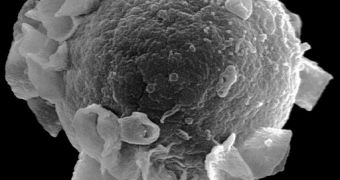Scientists discovered that the Epstein-Barr virus (EBV), can be a cause of cancer, in people with weak immune systems.
At some point in their lives, nearly 90% of people catch the EBV, but this usually does not affect them in any way.
The exception are those individuals with a weakened immune system, either by an organ transplant of HIV infection, and they have a serious risk of developing cancer because of this virus.
The Epstein-Barr virus infection can manifest itself differently for different people, for example, in kids aged 4-5 years, a first infection can cause a slight illness, but if this infections occurs during the teenage years, it can trigger mononucleosis with strong fatigue and other symptoms.
If people with compromised immune system get infected with the virus, it can actually do some serious damage and even cause several forms of lymphoma.
But how EBV caused cancer was unknown before the research carried out by scientists at the Duke Cancer Institute, who have found a pathway that infected cells use to root out EBV infections.
Senior author Micah Luftig, PhD, Assistant Professor of Molecular Genetics and Microbiology explained that “using cell culture studies, we have uncovered a major pathway that the infected host cell activates to prevent an oncogenic virus from causing cancer.
“We proposed that the cell was sensing that the virus is trying to take over.
“When this oncogenic stress response is activated, it keeps the virus in check, and now we know why.”
The researchers also learned how the Epstein-Barr virus overcomes the cell's response, and Luftig said that these “findings may eventually yield therapies to benefit people who don't have good immune systems and who need protection from a threatening EBV infection.”
Very early in life, for many people, there is a huge expansion of immune system B cells infected with EBV, but thanks to the oncogenic stress response and to the strong immune system, mosty of these infected cells are killed and the person stays healthy.
Luftig and his team, including lead authors Pavel Nikitin and Chris Yan, found two enzymes (kinases), which played a very important part in mediating this oncogenic stress response and preventing unchecked B-cell cell growth (immortalization).
When the scientists blocked the ATM and Chk2 kinases, 10 times more infected cells developed unchecked growth.
This type of cell growth is related to many types of cancer, including post-transplant lymphoproliferative disorder and HIV-associated B-cell lymphomas.
"This finding can be extended to the general case of any oncogene being activated that might start the process of tumor formation,” said Luftig.
“About 20 percent of all human cancers are caused by infectious agents, where about 80 percent of these infections are viral."”
A more known example of a viral infection leading to cancer is the human papillomavirus, which causes cervical cancer.
This work appeared in the online issue of Cell Host and Microbe.

 14 DAY TRIAL //
14 DAY TRIAL //